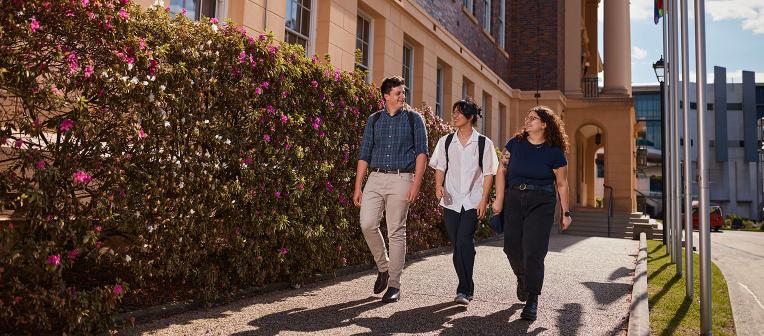If you identify as neurodivergent and are concerned about how you will adapt to life as a university student, it’s important to know that ongoing support is available.
Here at UQ, we offer a range of programs that provide study tips for neurodivergent students and assist with the transition to university life. Our Neurodivergent Hub can help you develop useful study strategies, form social connections and enhance your sense of belonging at UQ. While some of these programs aim to support you in your first year, they can also be accessed throughout your time at UQ.
Here’s the support you can receive as a neurodivergent student at UQ.
Tertiary Transition Toolbox
The Tertiary Transition Toolbox (TTT) is 2 half-day workshops held before Semester 1 that will help you build confidence and reduce anxiety as you prepare for your first year at UQ. It’s a “soft landing” for students to learn about the new expectations of uni life, how to find course resources and information in UQ’s systems, and how to manage some common challenges. During the TTT, you will meet several like-minded students also beginning their uni journey, and staff members you can check in with for guidance or advice throughout your studies.
It's important to know not only who to go to, but where you can go for different kinds of support. The TTT provides an optional campus tour that shows neurodivergent students these key locations, such as the low-light study space in the Central Library, the relaxation space in the Disability Collective’s office, and Student Central, where students can book counselling appointments or get general information.
The TTT also includes a session for parents and guardians of neurodivergent students, who might want to understand the challenges of uni life and how they can provide support.
The Disability Collective is a student-run group at UQ who foster a positive, welcoming and supportive community for those who experience disability, chronic illness, mental illness, neurodiversity and/or who are Deaf.
Neurodivergent Check-in
The first 2 weeks of your first semester are an important time to settle in, become familiar with uni routines, and understand what you need to do to achieve the grades you want. The Neurodivergent Hub offers a 1-hour check-in at the end of your second week at uni. This is an important opportunity to reflect on what has worked for you so far in the semester and voice any concerns you have, so you can put together a strategy to help navigate the rest of the semester. Time management, organisation, and self-care are important for all students to establish a healthy routine.
Neurodivergent students can create a Student Access Plan (SAP) in conjunction with a Student Adviser. A SAP will help communicate to your teachers any reasonable adjustments (such as extensions on assignments or accessible formatting) that may be actioned to accommodate your learning needs and help you meet your study goals.

Mentoring
The Neurodivergent Mentoring Program runs for 1 hour, once a week in the first 6 weeks of semester. Students are partnered with a mentor – a current UQ student with an interest in the neurodivergent uni experience – who can discuss goals for the semester, provide help with assignment planning and neurodivergent study tips, and share their perspective on how to navigate life as a uni student.
The mentoring program is an opportunity for students to develop strategies to remain organised, which can help you feel prepared when assessments pile up at the end of the semester. A mentor can also assist with the transition to university life, as seeing a familiar face regularly makes coming to campus feel a lot less intimidating.
Regular meet ups
Perhaps the most important step you can take to enhance your sense of belonging is to develop social connections with like-minded peers. The Neurodivergent Meet Ups Program gives neurodivergent students the opportunity to learn by sharing perspectives on weekly topics such as making friends, navigating respectful relationships, and making disclosures for work and study. Discussions are run by a team of mentors who are current students and are either neurodivergent themselves or are interested in improving the student experience.
Following these group discussions, students can continue to make friends while playing board games. The sessions also provide a range of stims and fidget toys, but you can also bring your own.
Many past students from the program have since become mentors in the following years, creating ways for students to enhance their employability and involvement in university life. Furthermore, making friends through the program can help you connect with other social events and groups in the UQ community.

Semester-long ADHD coaching
The ADHD Group Coaching Program provides students with a range of tools to help them effectively manage their studies. Each week, students are given a different strategy related to organisation, productivity, or general coping skills, which they can test drive. Through mentor-driven group discussions, students can reflect on their use of different strategies, and whether it has been effective. Developing a range of strategies is important for adapting to the changing workload and demands of study and other aspects of life.
The program is underpinned by peer-to-peer support, in which mentors – who study degrees in allied health – and other students can share their experiences of common challenges and the strategies they used to overcome them. This is a great opportunity to develop skills to cope with the challenges faced by university students, such as meeting constant deadlines, developing a manageable balance between study, work, and social life, and avoiding burnout.
Developing this skillset is not only useful for students with ADHD; many students are faced with similar challenges and could benefit from strategies that reduce cognitive load. As with all the programs the Neurodivergent Hub offers, students do not require an official diagnosis to utilise this program.
Looking for more study tips, including study skills workshops and assistance from Academic Skills Advisers? Visit our study skills and learning advice page to see the kind of academic support you’ll receive as a UQ student.
While many of the services we’ve covered can be accessed at any stage of your university journey, it’s especially important you’re aware of them from the very beginning. Knowing where to go for tailored support as a neurodivergent-identifying student will help you feel a strong sense of community at UQ. Good study habits, a manageable balance between work and study, and social connections can all be developed by utilising the Neurodivergent Hub’s programs during your studies.
Find out more about the types of emotional, financial and social support you’ll receive as a UQ student.






